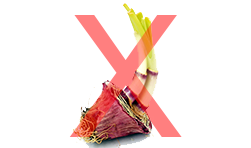Plate it
You can help prevent the introduction of exotic pests and diseases into Australia by making sure you do not plant food products that are intended for eating. When buying fresh, dried or preserved foods (including spices and seeds) from your local supermarket, general store or fruit and vegetable shop, make sure they are put on your plate for eating and not planted in your garden.
Plant-based goods, such as fruit, herbs, vegetables, spices, seeds, are imported into Australia for a variety of purposes and end uses, and import conditions depend on this. Goods for growing, such as seeds, are different from foods and have a higher risk of carrying pests and diseases so therefore face much tighter import conditions to make sure that they are safe.
Don’t plant it
The goods that you purchase from your supermarket, general store or fruit and vegetable shop are intended for eating. By planting them, you could unknowingly introduce exotic pests and diseases into the Australian environment. These pests and diseases could damage your home garden and then spread to native vegetation and rural areas, threatening our environment and our agricultural industries.
You can avoid introducing exotic pests and diseases into our environment by not planting food products meant for eating or cooking, including:
Seeds from fresh fruit or vegetables

Seeds from dried fruit or vegetables

Seeds of spices and herbs

Fresh herbs and sprouts

Fresh fruit or vegetables

Food scraps leftover from fresh fruit or vegetables

Clean gardening
Whether you’re a seasoned horticulturalist or a home gardener, it’s important that you know where your plants and seeds have come from and what they are intended for.
Buy your seed and plant material from reputable Australian suppliers. These suppliers have either sourced their products locally or imported them through certified channels. If you buy any plants or seeds from overseas suppliers, you must comply with the conditions on our Biosecurity Import Conditions system (BICON) and get an import permit if required.
Non-imported fruit and vegetable scraps
The ‘Plate it. Don’t plant it.’ message also applies to fruit and vegetable scraps and seeds that originate from Australian grown food. This is because there remains a much-reduced risk of spreading pests, including exotic pests and diseases, that occur in only limited parts of Australia. For example, bacterial wilt of potato is a devastating disease caused by a bacterium that we don’t want to spread further in Australia by planting old potatoes.
Our states and territories have unique flora and fauna to protect as well as valuable agricultural production areas. Our states and territories are also free from some pests and diseases found in other parts of Australia.
To help protect Australia from the spread of pests and diseases, remember to put your food on your plate and not in your garden.
Composting and worm farming
Adding plant-based food scraps to your compost pile or worm farm is a lower biosecurity risk because the goods are not planted directly into the ground.
It is good practice to avoid adding diseased plant material to your compost pile or worm farm and instead, throw it straight into your waste! This can help prevent the introduction and spread of plant pests and diseases into your garden, and the wider environment.
Plant-based foods, such as spices containing whole seeds, including whole chilli, coriander, cumin or fennel seeds, should be disposed of in the municipal waste as some of the seeds could be viable and host pathogens such as viruses and fungi that could introduce diseases into your garden.
Another technique to help manage plant pests and diseases in your garden is solarisation. Solarisation uses the sun’s heat to maintain high soil temperatures, which helps manage weeds and pests in organic waste and in the soil.
If you see anything unusual in your backyard, please call the Exotic Plant Pest hotline on 1800 084 881.
More information on good composting and solarisation practices:
- A beginner’s guide to composting - Department for Environment and Water, Government of South Australia
- Tips for gardeners - Department of Agriculture, Fisheries and Forestry
- Soil-borne diseases - Department of Primary Industries and Regional Development, Government of Western Australia
- Soil solarisation PDF (27.6 KB) - Northern Territory Government
